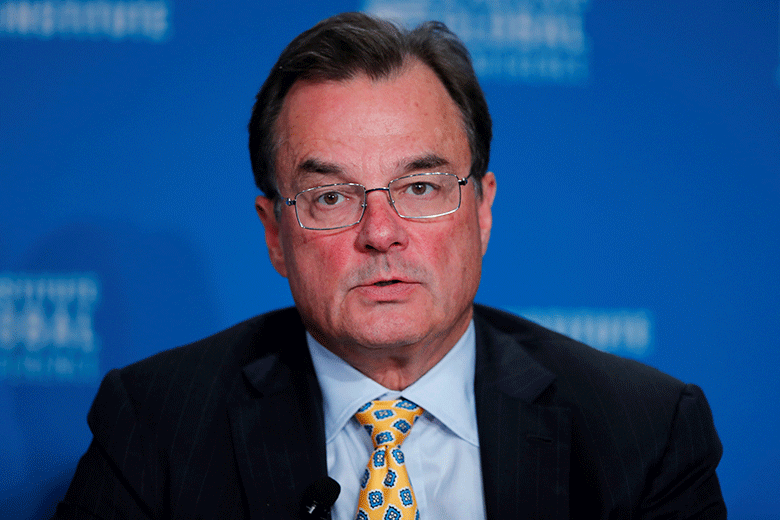Craig Phillips was hired by Mnuchin as a counsellor in January 2017
It can instead be viewed as a takeover of Washington roles by Wall Street.
Trump shows little interest in the details of key foreign policy issues such as relations with North Korea and Iran, so the idea that he would form a view on the intricacies of proprietary trading or derivatives regulation is laughable.
Treasury secretary, Steven Mnuchin, isn’t much of a policy wonk either, and many former colleagues now wonder how he ever managed to make partner at Goldman Sachs. Mnuchin knows where he stands on broad issues of regulation, however, and that is firmly in line with the interests of Goldman and other Wall Street firms.
The appointment of one of his key advisers indicates the extent to which Wall Street will tailor its views to co-opt Washington decision makers and secure its regulatory goals.
Craig Phillips was hired by Mnuchin as a counsellor in January 2017; an appointment that neatly avoided the need for congressional confirmation and seems to have been conducted with enough discretion to avoid provoking the ire of Trump.
Washington swamp
Phillips had served on Hillary Clinton’s national finance committee and raised enough money for her campaign to earn the informal title of ‘Hillblazer’. A role fundraising for “Crooked Hillary”, as Trump calls her, might not make Phillips an obvious fit for an administration that supposedly aims to drain the Washington swamp.
But Phillips – a veteran of BlackRock, Morgan Stanley and Credit Suisse – clearly decided that a position in any administration was better than none. And his long-standing acquaintance Mnuchin appears to have been happy to hire a banker with a detailed knowledge of Wall Street practices from positions including running the financial markets advisory group at BlackRock Solutions and managing securitized products at Credit Suisse First Boston.
Phillips attended the recent AGM of the International Swaps and Derivatives Association (Isda) in Miami and delivered a reassuring message to delegates. He began with a reference to the great leader in Washington that was either shameless or tongue in cheek, or both.
“The president brilliantly issued in February 7th, 2017, a directive, an executive order,” Phillips said, referring to the vaguely worded announcement by Trump of “core principles” designed to roll back Obama-era regulations. Those principles are now being enacted, partly by legislation but, more importantly, by changes to regulatory implementation.
Phillips presented this as a sensible adjustment to rules.
“I wouldn’t call it deregulation but rebalancing,” he told Isda delegates, adding that the Treasury is urging regulators to implement a “rationalization” of the Volcker Rule, not a repeal.
“We did not advocate a return to proprietary trading,” he said.
Increased leeway
Whether or not Trump administration officials advocate for a return to proprietary trading, it seems that banks will have increased leeway to decide what constitutes a reasonable increase in risk taking designed to boost returns from market making.
There are already signs that Goldman and other US banks are gradually increasing their exposure in areas ranging from distressed debt trading to dealing in gas and power derivatives. Moves to re-establish standalone proprietary dealing desks are highly unlikely, if only because they would be unpopular with shareholders.
Open telegraphing of a push to increase proprietary trading exposure would also be unnecessary. With sympathetic officials holding key roles both within the Trump administration and at US regulators, there is little need for Wall Street to worry about any annoying scrutiny of dealing practices.


 Signal2forex.com - Best Forex robots and signals
Signal2forex.com - Best Forex robots and signals




